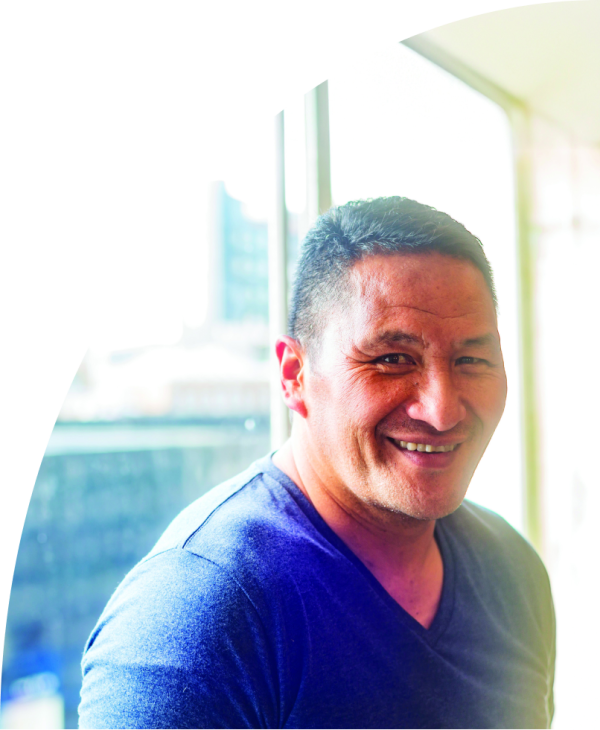The experiences of iwi and Māori Ngā wheako o ngā iwi me te Māori
What people said worked well | Ko ngā mea i kī te tangata i pai
- Local, iwi or community-led responses are effective and efficient.
- Māori community-based responses were able to engage with local people faster and more directly than government agencies.
- Prioritising Māori during the pandemic response, particularly during the vaccine rollout, was the right thing to do given the discrepancy in health outcomes for Māori compared to other ethnicities.
- Expert input and leadership from Māori are welcomed and were proven to be effective during the COVID-19 pandemic
What people said didn’t work or could be improved | Ko ngā mea i kī te tangata kāore i pai, me pai ake rānei
- Pandemic restrictions disrupted people’s ability to practise aspects of tikanga Māori, which was challenging.
- More iwi and Māori involvement in the early phases of the COVID-19 response would have resulted in better outcomes for Māori.
What people suggested for the future | Ngā mea i whakatakotoria mai mō muri ake
- Māori needs should be specifically addressed in any future pandemic response.
- Treaty of Waitangi obligations must be at the forefront of decision-making in a pandemic. Iwi, hapū, marae and Māori organisations need to be engaged in decision-making.
- More responsibility should be given to Māori health providers and organisations to deliver better health outcomes for Māori.
- The health system should generally be more responsive, more welcoming, and better resourced to improve health outcomes for Māori.
- Ensure that Māori health initiatives are well funded so they can continue to serve their communities and deliver good health outcomes for Māori.
Self-determination | Tino rangatiratanga
People told us that local, iwi or community-led responses were effective and efficient. They felt that Māori community-based responses were able to engage with local people faster and more directly than government agencies.
“I work for a Māori health provider; we are not a primary health organisation or a general practice. We did not have access to the same channels of communication as other mainstream providers DESPITE offering more services than other health providers in our area.
For example, our nurses were doing homebased swabbing and vaccination, and providing COVID-care and post-COVID follow up to Māori whānau who did not have a GP. Our organisation set up the only drive-thru site in our region, and we delivered pop-up vaccination clinics in remote and rural areas.
The only reason we stayed in the loop was because our management and nursing teams had good relationships with the primary health organisation management team and the immunisation coordinator at our DHB… You need to give more credit and have more faith in Māori providers. We are so very capable. We are not weighed down by excessive bureaucracy and layers of management which means we can make decisions fast and act fast.”
45–54-year-old Māori (Ngāi Tahu, Murihiku) female
“Māori health organisations, marae and other collectives in our area played a big part in keeping everyone safe and supported. Family and friends elsewhere also benefited from the hard work done by Māori organisations in other areas across the country.”
45–54-year-old Pākehā female, Wellington
Alongside the praise for Māori-led responses, people acknowledged the need for iwi, hapū, marae and Māori organisations to be involved in decision-making.
People also felt that giving more responsibility to Māori health providers and organisations would help improve general health outcomes for Māori.
Others felt that vaccine mandates took away people’s bodily autonomy, noting that this could be of particular concern for Māori people who may already struggle to trust the Government and the health system due to historic harms.
People told us that the pandemic restrictions, particularly lockdowns and vaccine mandates, also prevented the ability to practise some aspects of tikanga Māori.
 Equitable treatment | Ōritetanga
Equitable treatment | Ōritetanga
Some people praised the prioritisation of Māori during the pandemic response, particularly in relation to the vaccine rollout, given the discrepancy in health outcomes for Māori. People felt that this should be repeated in any future pandemic.
Others suggested that the health system should be more responsive, more welcoming and better resourced, to help improve health outcomes for Māori in any future pandemics.
Governance | Kāwanatanga
People told us of their support for expert involvement and leadership from Māori, noting that this was shown to be effective during the COVID-19 pandemic. People also felt that more Māori involvement in the early phases of the COVID-19 response would have resulted in better outcomes for Māori.
In particular, people emphasised that providing enough funding so that Māori can lead pandemic initiatives is essential, and a Te Tiriti o Waitangi (Treaty of Waitangi) obligation. These people noted that treaty obligations should be at the forefront of decision-making in a pandemic.
“Of 50 kaimahi [colleagues] at the marae I worked for, I and one other refused the jab. We were told our employment was in jeopardy. The threat of unemployment weighed heavily, which caused disharmony in my home. My colleague and I were excluded from meeting in the wharenui [meeting house] – we were lepers in Te Ao Māori [the Māori world]. There is no way our brave seafaring tupuna [ancestors] would have condoned this. The cultural significance of separating Māori from their wharenui cannot be understated.”
45–54-year-old Māori male
“The way we operate in our Māori communities is that we know each other and what is going on, so we work collaboratively and we support people who need it. That’s our greatest benefit. We can act, because we know who to go to.”
Kaumātua and kuia assisted feedback session, Northland

